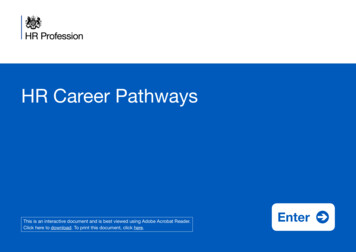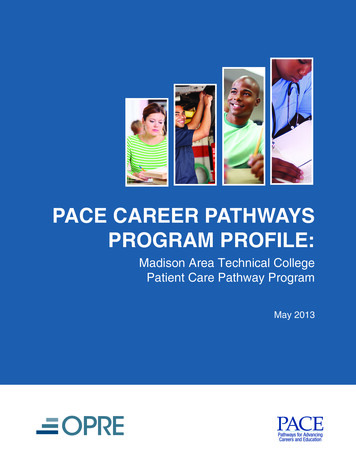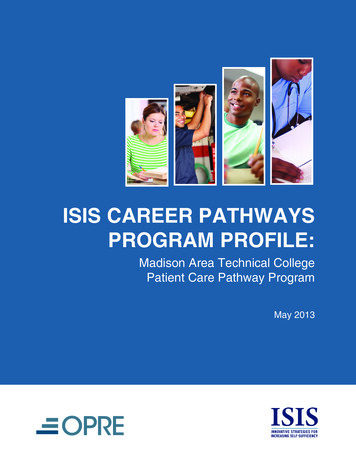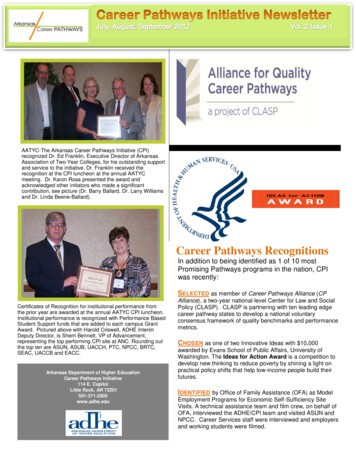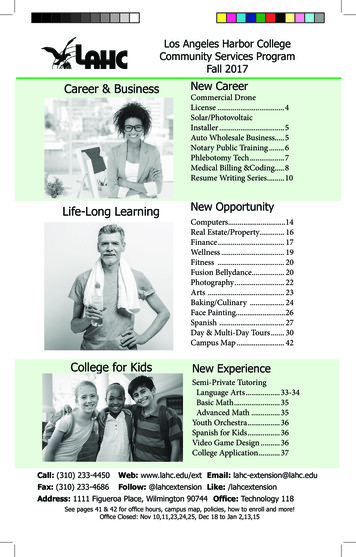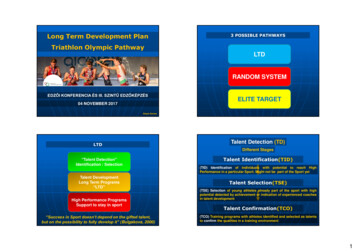
Transcription
Pathways to a Careerin Behavioral HealthIf you have a passion for helping others,possess good listening and communicationskills, and enjoy interacting with people,then this could be the field for you.With a career in behavioral health,you can help change lives for the better.unmc.edu/bhecn
Thinking About a Career in Behavioral Health?Behavioral health careers involve providing services for children,adolescents and adults who may be experiencing behavioral andemotional problems, mental illness, life stresses and/or substanceabuse. A wide range of career options are available, so it can bedifficult to choose a path or know where to begin. Here’s somebasic information to help you get started.Licensed Behavioral Health ProfessionsPsychiatristPRESCRIBERPsychiatrists are licensed physicians who specialize in the diagnosis, treatment and prevention of mental illnesses inchildren, adolescents and adults. They may work with patients on everyday problems, such as stress, or more complexissues, such as schizophrenia. Psychiatrists prescribe medications, provide talk therapy and care for patients withcomplex medical problems. Education Requirements: Typically a bachelor’s degree with pre-medicine coursework, followed by medical schooland residency with an optional fellowship for specialized skills. Expect 12 years of coursework post-high school. Work Environment: Academic health centers, private practice, hospitals, primary care clinics, community agencies,courts and prisons, long-term care/assisted living/hospice, industry, government, military settings, schools anduniversities, substance use programs, emergency rooms. Projected Growth: 14 percent (much higher than average).Physician AssistantAverage Salary: 180,260PRESCRIBERPhysician assistants (PAs) practice medicine under physician supervision. PAs conduct medical histories and physicals,perform psychiatric evaluations and assessments, order and interpret diagnostic studies, and establish and managetreatment plans, which includes prescribing medications and ordering referrals as needed. PA students receive a broadmedical education, including classroom study and clinical rotations in psychiatry, geriatrics, family practice and more. Education Requirements: Typically a bachelor’s degree, then PA graduate school, including a mix of classroom workand supervised patient care over two to three years. Expect about six years of coursework post-high school. Work Environment: Behavioral health facilities, psychiatric hospital units, private practice, psychiatric emergencydepartments, emergency rooms, private health clinics, prisons and jails. Projected Growth: 30 percent (much higher than average).Average Salary: 95,340To find more information and resources about behavioral health careers,visit BHECN’s webpage at unmc.edu/bhecn/career-pathways.
Psychiatric Nurse Practitioner (APRN-NP)PRESCRIBERPsychiatric Nurse Practitioners are advanced practice registered nurses (APRN-NP) who can diagnose and treat mentalillnesses and promote the mental health of individuals and families. Psychiatric nurse practitioners offer psychiatric/mentalhealth assessments, order laboratory tests, conduct psychotherapy, and manage medications. They specialize in treatingthose who have more serious mental health problems than those managed by a local primary care physician.There are also opportunities for nurses (RNs, LPNs) and nursing assistants (CNAs, psychiatric technicians) to work ininpatient and outpatient psychiatric settings. Education Requirements: Typically Bachelor of Science in Nursing (BSN) and Master of Science in Nursing (MSN) orDoctor of Nursing Practice (DNP) degrees. Expect six to nine years of coursework post-high school. Work Environment: Offices of physicians or other health practitioners, private practice, hospitals, outpatient clinics,community agencies, colleges and universities. Projected Growth: 31 percent (much higher than average).Average Salary: 91,100Licensed PsychologistA psychologist is an independently licensed behavioral health professional who performs psychological assessments,provides therapy, and conducts research on mental health disorders. Licensed psychologists require a doctoral degree(Ph.D.) in an applied area of psychology, such as the following: Clinical psychologists assess, diagnose and treat mental, emotional and behavioral disorders, and help people manageproblems ranging from short-term personal issues to severe mental illness, such as bipolar disorder, major depressionand schizophrenia. Counseling psychologists assess and treat patients with difficulties related to social and emotional problems, includingmajor life events at home or in the workplace (issues at work, marriage problems, loss of a loved one). School psychologists work in schools to diagnose and treat child behavioral and learning problems; design andimplement treatment plans and evaluate performances; and provide therapy to students and families. Education Requirements: Bachelor’s degree followed by graduate school (some graduate programs require a bachelor’sin psychology). Clinical and counseling psychologists typically pursue a Ph.D. or Psy.D. School psychologists can alsopursue an Ed.S. (educational specialist degree). Expect seven to 10 years of coursework post-high school. Work Environment: Human service agencies, hospitals, universities, government agencies, private mental healthpractices, primary care practices, rehabilitation facilities, correctional institutions, elementary and secondaryschools (particularly for Ed.S. school psychologists). Projected Growth: 19 percent (higher than average).Average Salary: 98,000unmc.edu/bhecn
Professional Mental Health CounselorA professional mental health counselor creates purposeful relationships that empower diverse individuals, couples,families, children, adolescents and groups to accomplish mental health, wellness, education and career goals. They applymental health, psychological, human development, or family systems principles and interventions to help clients adjusttheir thoughts, feelings or actions. They also diagnose and treat mental and emotional disorders, such as anxietyand depression. Education Requirements: Typically a bachelor’s degree followed by a master’s degree that includes a supervisedpracticum and internship. Expect six to seven years of coursework post-high school. Work Environment: Individual and family services; outpatient and inpatient intellectual and developmental disability,mental health, and substance abuse centers; hospitals; state and local government. Projected Growth: 20 percent (much higher than average).Marriage and Family TherapistAverage Salary: 46,510Marriage and family therapists (MFTs) work with individuals, couples and families. Unlike other types of mental healthprofessionals, they bring a family-centered perspective to treatment, even when treating individuals. They evaluate familyroles and development to understand how clients’ families affect their mental health. They treat the clients’ relationships,not just the clients themselves, and address issues such as low self-esteem, stress, addiction and substance abuse. Education Requirements: Typically a bachelor’s degree followed by a master’s degree in marriage and family therapy.Expect six years of coursework post-high school. Work Environment: Individual and family services, state and local government, outpatient care centers, offices of otherhealth practitioners, nursing and residential care facilities. Projected Growth: 15 percent (much higher than average).Average Salary: 43,390Clinical Social WorkerClinical social work is a specialty practice area of social work that focuses on the assessment, diagnosis, treatmentand prevention of mental illness and emotional and other behavioral disturbances. Individual, group and family therapyare common treatment modalities. Clinical social workers are required to have a master’s degree in social work andstate licensure. Education Requirements: Typically a bachelor’s degree, followed by a master’s in a social work program that includesa practicum to gain experience working with people. Expect about six years of coursework post-high school. Work Environment: Hospitals; senior centers and long-term care facilities; mental health clinics; private practices; stateand local governments; schools, colleges and universities; substance abuse clinics; military bases and hospitals;correctional facilities; child welfare agencies; employee assistance programs. Projected Growth: 12 percent (higher than average).Substance Use Disorder CounselorAverage Salary: 41,426Substance use disorder counselors evaluate individuals for substance use disorder, assess for openness to treatment,develop treatment goals, recommend treatment options and help clients develop skills to recover from substance usedisorder. They also assist and teach families about substance use disorders and refer clients to community resources. Education Requirements: There are many routes to becoming a substance use disorder counselor. Individuals canenter this field with either a high school diploma or a college degree*, as long as they have the initial substance abusedisorder education and the required number of supervised practice hours. Expect one to six years of courseworkpost-high school.* A related associate’s degree can be in addictions or chemical dependency; related bachelor’s and/or master’s degree can bein counseling, addictions, social work, sociology or psychology. Work Environment: Outpatient care centers; residential intellectual and developmental disability mental health, andsubstance abuse facilities; individual and family services; hospitals; state and local government, excluding educationand hospitals. Projected Growth: 22 percent (much higher than average).Average Salary: 40,900Resources: Bureau of Labor Statistics; U.S. Department of Labor; Occupational Outlook Handbook, 2016-17 Edition; National Association of SocialWorkers; Nebraska Department of Health and Human Services; American Psychiatric Nurses Association; University of Nebraska–Lincoln;University of Nebraska Medical Center; American Psychiatric Association; State Occupational Employment and Wages, May 2015; Salaries inPsychology; Center for Workforce Studies.
YSICIANASSISTANTPSYCHIATRISTCAREERHIGH SCHOOLDIPLOMAASSOCIATE’SDEGREE2- to 3-year master’sdegree (MSN)OR3- to 4-yeardoctorate (DNP)(Both includepracticum) 5-6 years (Ph.D.or Psy.D.professionalschool) Schoolpsychologists canalso complete a3-year Ed.S.(Both includeinternship)OR12-monthaccelerated BSNif already holdbachelor’s degree4 years2-3 years(Includes clerkship/rotation)4 years4-year bachelor’sdegree (BSN, RN)4 years of medicalschool4 yearsMEDICAL/ Fellowship:1 year Fellowship:1 year (optional) Residency: 4 years Fellowship: 1 to 2years (optional)PROGRAMSREQUIREDLICENSE Clinical Counseling SchoolNurse PractitionerLicense UNK2 (school psych Psychology LicenseEd.S.)(required for UNL3 (Ph.D. inpractice ofclinical,psychology)counseling, school, Certification withand Ed.S.)State Department UNO4 (psych MA,of Educationschool psych Ed.S.)(required forschool psychology,Ed.S.) Child & adolescent UNMC1 (MSN,mental healthDNP) Creighton University9nursing(DNP) Gerontologicalpsychiatric nursing Substance usedisorders UNMC1 (Omaha &Physician AssistantLicenseKearney) Creighton University9 College of SaintMary8 Union College15 UNMC1 (M.D., D.O.) Medical License Addiction Child & adolescent Creighton University9(residency) Forensic Geriatric RADUATE reer-pathwaysThe Path to LicensedBehavioral Health CareersPRESCRIBERS
SUBSTANCEUSE DISORDERCOUNSELORCLINICALSOCIALWORKERMARRIAGE R all of thefollowing: Associate’s degree 270 hrs.substancedisordereducation 5,000 hrs.supervisedpracticeOR all of thefollowing: Bachelor’s degree 270 hrs.substancedisordereducation 4,000 hrs.supervisedpracticeOR all of thefollowing: Master’s degree 270 hrs.substancedisordereducation 2,000 hrs.supervisedpractice2-3 years(Includespracticum)2 years(Includespracticum)2-3 years(Includespracticum andinternship) 3,000 hrs.supervisedpractice1 University of Nebraska Medical Center 402.559.40002 University of Nebraska–Kearney 308.865.84413 University of Nebraska–Lincoln 402.472.72114 University of Nebraska–Omaha 402.554.28005 Bellevue University Bellevue 402.293.20006 Central Community College Columbus Grand Island Hastings 308.398.42227 Chadron State College Chadron 308.432.60008 College of Saint Mary Omaha 402.399.24009 Creighton University Omaha 402.280.270010 Doane University Crete Lincoln 402.826.216111 Metropolitan Community College Omaha 800.228.955312 Northeast Community College Norfolk O’Neill Sioux City West Point 402.371.202013 Peru State College Peru 402.872.381514 Southeast Community College Lincoln 402.471.333315 Union College Lincoln 402.486.260016 Wayne State College Wayne 866.972.228717 Western Nebraska Community College Alliance Scottsbluff Sidney 308.635.3606All of the following: High schooldiploma 270 hrs.substancedisordereducation 6,000 hrs.supervisedpractice4 years4 years4 years UNL3Substance disorderLADC*education programs: UNK2 Bellevue University5 CCC6 MCC11 NCC12 PSC13 SCC14 CSC7 Doane University10 WNCC17* CMFT: Certified Marriage & Family Therapist* CPC: Certified Professional Counselor* LADC: Licensed Alcohol & Drug Counselor* LCSW: Licensed Clinical Social Worker* LIMHP: Licensed Independent Mental Health Practitioner* LMHP: Licensed Mental Health Practitioner Dual disorder(if also holdLIMHP*/LMHP*) LMHP* Optional: LCSW*,LADC*, LIMHP*Available licenses:CMFT*, LMHP*,LIMHP*Master’s programs: LMHP*/LIMHP* UNK2 Optional: CPC* UNO4 Bellevue University5 CSC7 Doane University10 Wayne State16 Micro – individuals, UNK2 (off-campusfamilies, children,program)couples, group, UNO4 (MSW)etc. Macro – policy,administration Rural mentalhealth Tele-mental health Individuals Families Children Couples Group
Master’s programs: 2 UNK UNO 4 Bellevue University 5 CSC 7 Doane University 10 Wayne State 16 LMHP*/LIMHP* Optional: CPC* PROFESSIONAL MENTAL HEALTH COUNSELOR SUBSTANCE USE DISORDER COUNSELOR All of the following: High school diploma 270 hrs.
